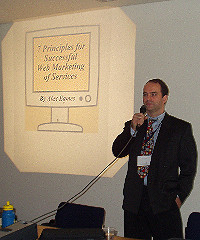When the translation industry does not keep up with the (old) news :-( Thread poster: Catherine GUILLIAUMET
|
|---|
Hi,
On this Sunday morning, I feel the need to rant !
Last week, I had to deal with two issues, both about the European Medicines Agency.
As you certainly remember the agency changed its name, logo, slogan, etc. on December 8th, 2009.
The EMEA became the EMA.
But it seems that some professionals involved in the Medical Translation Industry are not yet aware of this fact, nearly one year later !
First issue : an agency... See more Hi,
On this Sunday morning, I feel the need to rant !
Last week, I had to deal with two issues, both about the European Medicines Agency.
As you certainly remember the agency changed its name, logo, slogan, etc. on December 8th, 2009.
The EMEA became the EMA.
But it seems that some professionals involved in the Medical Translation Industry are not yet aware of this fact, nearly one year later !
First issue : an agency called me, furious, claiming that I made 37 mistakes in a 2,000-words project and that it was unacceptable from someone who called herself a specialist and they added that they will pay only the half of the price. I was so shocked ! I asked them to send me back the "edited" translation. They eventually accepted.
And what did I discover ?
The 37 so-called "mistakes", were only repetitions of the same acronym "EMA", which was edited everytime and substituted by "EMEA".
Useless to describe to you the great satisfaction I got from referring them to the EMA site, with a poisoned and scathing message
Thereafter, I condescended to accept their apologies.
Second issue : Me, in the role of the editor this time. It was not so easy to convince both the translator and the agency that EMA was to be used instead of EMEA.
I don't know if you ever had to suffer such "adverse events" in your carrer, but as far as the EMA/EMEA issue is concerned, I suggest to keep writing "EMA (formerly EMEA)" [or "EMA (ex-EMEA)", in French], at least until everybody is aware of the change, if this ever happens ...
Have a nice Sunday
Catherine ▲ Collapse
| | | | Samuel Murray 
Netherlands
Local time: 20:14
Member (2006)
English to Afrikaans
+ ...
Catherine GUILLIAUMET wrote:
The 37 so-called "mistakes", were only repetitions of the same acronym "EMA", which was edited everytime and substituted by "EMEA".
Whenever I find that a translator had consistently mistranslated an abbreviation, I smell a rat and investigate, because it sometimes means that the translator knew something I didn't (such as a new term that is currently preferred, and me not knowing it). Surely if your client had seen that you had *consistently* made that error, they would have investigated it, and surely the first place to look would be on the agency's own web site... duh!
Me, in the role of the editor this time. It was not so easy to convince both the translator and the agency that EMA was to be used instead of EMEA.
I tend to stick to the source text, so if the source text has the old abbreviation, I'd use it too. I realise that this principle may not apply in the case with EMA, but that's what I usually do.
| | | | Kaspars Melkis 
United Kingdom
Local time: 19:14
English to Latvian
+ ...
| It is just an acronym | Oct 17, 2010 |
While I support using EMA as it is more common now, I don't think that a translator should be penalized for consistently using one or another unless the client has given specific instructions which one to use. What difference does it really make officially or otherwise?
Form Wikipedia:
Set up by EC Regulation No. 2309/93 as the European Agency for the Evaluation of Medicinal Products, and renamed by EC Regulation No. 726/2004 to the European Medicines Agency, it had the acronym EMEA until December 2009. The European Medicines Agency does not call itself EMA either - it currently has no official acronym but may reconsider if EMA becomes commonly accepted (see communication on new visual identity and logo).
So, the correct way would be to write in full "European Medicines Agency" in the first instance followed by "(EMA)" or "(EMEA)" and consistently using this acronym later on.
| | | | |
|
|
|
| Sometimes the remedy is worse than the disease | Oct 17, 2010 |
Catherine GUILLIAUMET wrote: Hi, On this Sunday morning, I feel the need to rant ! Last week, I had to deal with two issues, both about the European Medicines Agency. As you certainly remember the agency changed its name, logo, slogan, etc. on December 8th, 2009. The EMEA became the EMA. But it seems that some professionals involved in the Medical Translation Industry are not yet aware of this fact, nearly one year later ! First issue : an agency called me, furious, claiming that I made 37 mistakes in a 2,000-words project and that it was unacceptable from someone who called herself a specialist and they added that they will pay only the half of the price. I was so shocked ! I asked them to send me back the "edited" translation. They eventually accepted. And what did I discover ? The 37 so-called "mistakes", were only repetitions of the same acronym "EMA", which was edited everytime and substituted by "EMEA". Useless to describe to you the great satisfaction I got from referring them to the EMA site, with a poisoned and scathing message  Thereafter, I condescended to accept their apologies. Second issue : Me, in the role of the editor this time. It was not so easy to convince both the translator and the agency that EMA was to be used instead of EMEA. I don't know if you ever had to suffer such "adverse events" in your carrer, but as far as the EMA/EMEA issue is concerned, I suggest to keep writing " EMA (formerly EMEA)" [or "EMA (ex-EMEA)", in French], at least until everybody is aware of the change, if this ever happens ...  Have a nice Sunday Catherine
It has been changed to avoid confusions with the very same acronym (Eastern Europe, Middle East] and Africa) that can be seen in near all international enterprises websites.
But, imho sometimes the remedy is worse than the disease...
[Edited at 2010-10-17 12:05 GMT]
| | | | | Great, Teresa ! | Oct 17, 2010 |
Thank you, Teresa, for this useful list !
I saved it on my HD, so next time, I'll send it to the "other party", whatever could be their claims.
Of course, if the publication to be translated is "historical" - I mean written before december 2009 - the old acronym "EMEA" is to be kept, maybe with a translator's note :"known today as EMA" (for those young generations - or even for the elder ones who might have a short memory
Bon dimanche !
Catherine
| | | | Claudio Porcellana (X) 
Italy
| When the translation industry does not keep up with the (old) news :-( | Oct 17, 2010 |
the same for many other standards!
for example, ICD-9 and 10, Chemical Risk & Safety Phrases, IS-SI rules, UNI-ISO Symbols for use in the labelling of medical devices, etc.
many translators and even authors of original documents and/or institutional websites don't know the standard terminology
sometimes, the client doesn't want any changes to avoid confusion with old translations, already published, while sometimes it's happy for improving them and I... See more the same for many other standards!
for example, ICD-9 and 10, Chemical Risk & Safety Phrases, IS-SI rules, UNI-ISO Symbols for use in the labelling of medical devices, etc.
many translators and even authors of original documents and/or institutional websites don't know the standard terminology
sometimes, the client doesn't want any changes to avoid confusion with old translations, already published, while sometimes it's happy for improving them and I'm happy too then

Claudio ▲ Collapse
| | | | Kaspars Melkis 
United Kingdom
Local time: 19:14
English to Latvian
+ ...
| EU and national styles may be different | Oct 18, 2010 |
At least in Latvian you have to be aware who you are working for.
For example, the basic phrase "prescribe drugs" is translated as "parakstīt zāles" in EU documents but very often as "izrakstīt zāles" in national legislation.
Even the most basic word for currency is officially written as "euro" in EU documents (Latvian translations) and as "eiro" in all national texts. This and other instances where EU style linguistically doesn't make any sense in Latvian will be ... See more At least in Latvian you have to be aware who you are working for.
For example, the basic phrase "prescribe drugs" is translated as "parakstīt zāles" in EU documents but very often as "izrakstīt zāles" in national legislation.
Even the most basic word for currency is officially written as "euro" in EU documents (Latvian translations) and as "eiro" in all national texts. This and other instances where EU style linguistically doesn't make any sense in Latvian will be ignored whenever possible. ▲ Collapse
| | |
|
|
|
MMUlr 
Germany
Local time: 20:14
English to German
+ ...
| And more of those .... | Oct 21, 2010 |
Claudio Porcellana wrote: the same for many other standards! for example, ICD-9 and 10, Chemical Risk & Safety Phrases, IS-SI rules, UNI-ISO Symbols for use in the labelling of medical devices, etc. many translators and even authors of original documents and/or institutional websites don't know the standard terminology sometimes, the client doesn't want any changes to avoid confusion with old translations, already published, while sometimes it's happy for improving them and I'm happy too then  Claudio
In nearly 90% of texts (EN -> DE translations), I still read "Warenzeichen" for "Marke" - and Marke does exist approx. 15 years now
Also - but this is an "internal German issue": Approx. 10 years ago, the acronym for Verordnung in German laws changed from VO to V - but there are numerous texts, also lawyers' letters, still including the old VO.
So to me, the 1-year delay of "learning" EMA for EMEA is a still very short period.
Regards,
Margret
| | | | | What if the document itself is old? | Oct 21, 2010 |
I know this is probably a different situation, but what if the text you have to translate was written before such a change took place, for example a piece of legislative text with a clear date etc. on it, and it contains an abbreviation or the full name of an institute that has changed since then?
For example, the name of a ministry or some other authority?
I would be uncomfortable to just change it to the new name.
In a few cases I faced this situation I used th... See more I know this is probably a different situation, but what if the text you have to translate was written before such a change took place, for example a piece of legislative text with a clear date etc. on it, and it contains an abbreviation or the full name of an institute that has changed since then?
For example, the name of a ministry or some other authority?
I would be uncomfortable to just change it to the new name.
In a few cases I faced this situation I used the old name in the translation, but added a note indicating that the name has changed since then.
Is it what everybody else is doing?
Katalin ▲ Collapse
| | | | Alex Eames
Local time: 19:14
English to Polish
+ ...
| classic case of a footnote or translator's note | Oct 21, 2010 |
Katalin Horvath McClure wrote:
I know this is probably a different situation, but what if the text you have to translate was written before such a change took place, for example a piece of legislative text with a clear date etc. on it, and it contains an abbreviation or the full name of an institute that has changed since then?
For example, the name of a ministry or some other authority?
I would be uncomfortable to just change it to the new name.
In a few cases I faced this situation I used the old name in the translation, but added a note indicating that the name has changed since then.
Is it what everybody else is doing?
Katalin
I think that's a classic example of a good place to use a footnote or translator's note at the first ocurrence of the acronym in the document.
| | | | | History is historical :-) | Oct 21, 2010 |
Katalin Horvath McClure wrote:
I know this is probably a different situation, but what if the text you have to translate was written before such a change took place, for example a piece of legislative text with a clear date etc. on it, and it contains an abbreviation or the full name of an institute that has changed since then?
For example, the name of a ministry or some other authority?
I would be uncomfortable to just change it to the new name.
In a few cases I faced this situation I used the old name in the translation, but added a note indicating that the name has changed since then.
Is it what everybody else is doing?
Katalin
As I suggested about the EMEA documents published before december 8th, 2009, or speaking of EMEA before this date, EMEA keeps its former name :
Of course, if the publication to be translated is "historical" - I mean written before december 2009 - the old acronym "EMEA" is to be kept, maybe with a translator's note:"known today as EMA" (for those young generations - or even for the elder ones who might have a short memory 
Have a nice evening
Catherine
| | |
|
|
|
Lionel_M (X)
Local time: 20:14
English to French
+ ...
Katalin Horvath McClure wrote:
I know this is probably a different situation, but what if the text you have to translate was written before such a change took place, for example a piece of legislative text with a clear date etc. on it, and it contains an abbreviation or the full name of an institute that has changed since then?
For example, the name of a ministry or some other authority?
I would be uncomfortable to just change it to the new name.
In a few cases I faced this situation I used the old name in the translation, but added a note indicating that the name has changed since then.
Is it what everybody else is doing?
Katalin
It happens very often that an SPC/PIL has been written following "old" QRD templates.
For instance before "fertility" came up.
In these case, we MUST update to the last template available.
BTW, be aware that new QRD template should arrive soon to subsitute current version....have a look to EMA site
| | | | To report site rules violations or get help, contact a site moderator: You can also contact site staff by submitting a support request » When the translation industry does not keep up with the (old) news :-( | TM-Town | Manage your TMs and Terms ... and boost your translation business
Are you ready for something fresh in the industry? TM-Town is a unique new site for you -- the freelance translator -- to store, manage and share translation memories (TMs) and glossaries...and potentially meet new clients on the basis of your prior work.
More info » |
| | CafeTran Espresso | You've never met a CAT tool this clever!
Translate faster & easier, using a sophisticated CAT tool built by a translator / developer.
Accept jobs from clients who use Trados, MemoQ, Wordfast & major CAT tools.
Download and start using CafeTran Espresso -- for free
Buy now! » |
|
| | | | X Sign in to your ProZ.com account... | | | | | |











